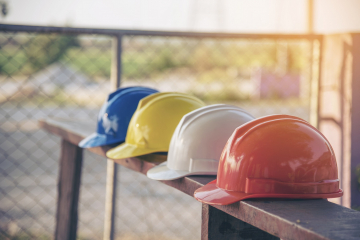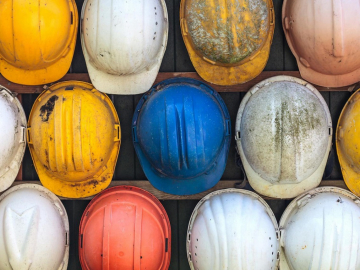Working in EHS can be a bit of an undersung job.
Environment, Health, and Safety (EHS) professionals don’t tend to get their names in the headlines, yet their work is a fundamental underpinning of industry. Countless people work tirelessly to protect their employees, their companies, and the world we live in — often with little fanfare. With the current state of the world, expertise around EHS within the workplace feels more critical and urgent than ever before.
So, at Antea Group, we like to shine a spotlight on different EHS-related roles and take a closer look at what their day-to-day is like. Following our write-up on the evolving role of environmental engineers, today we’ll dive into what industrial hygienists contribute to EHS, especially during this pivotal time.
What is Industrial Hygiene?
Industrial hygiene is both a science and art. The practice is devoted to the anticipation, recognition, evaluation, prevention, and control of environmental factors or stresses arising in or from the workplace. These factors may cause sickness, impaired health and well-being, or significant discomfort among workers or citizens of the community
What Is an Industrial Hygienist?
Industrial hygienists (or occupational hygienists) are applied scientists and engineers that help to manage and mitigate different aspects of industrial hygiene. In other words, they work to proactively recognize, evaluate, and control harmful substances or potential hazards involved with manufacturing, processing, construction, and other operational processes. Based on the hazards or potential hazards that might be present, they can recommend administrative or engineering systems to control these hazards or can help the employer evaluate what type of personal protective equipment might be needed to do the job that needs to be performed.
If that sounds like a broad range of work, it certainly is. Industrial hygienists are needed in almost every industry.
What Does an Industrial Hygienist Do?
At the core of the profession, industrial hygiene is about keeping people and their surrounding environments safe. This can manifest through a wide range of specialty areas, such as radiation, ergonomics, particulate matter, or really anything that can do harm to a person’s health.
Industrial hygienists can act as “hazard detectives,” using their knowledge base in chemistry, biology, physics, and human health to identify and evaluate potential workplace health risks. This can be done using direct reading instruments or it might be done by taking samples of the air in the environment of the worker. Once data is collected, it needs to be interpreted to understand exactly what the risks might be and how perhaps the risk can be eliminated or minimized.
Although industrial hygienists will often deal directly with technology on-site to identify hazards and assess risk, they also act as consultants, helping to guide and align company policies with financial, physical, and psychological realities. Industrial hygienists can make recommendations that affect individual worksites, or EHS initiatives that span the entire organization.
Once they’ve assessed the risk of a given potential hazard, they can also weigh in on the proposed control measures to ensure a sustainable, effective solution. For instance, if the hygienist finds that noise levels in a factory are too high, can they engineer a solution to reduce the harmful noise level? If they can’t engineer a solution, can they minimize the amount of time a person is in contact with the noise? Finally, if the source cannot be eliminated and an employee will continue to be in contact with the noise, can they find suitable personal protection equipment that will reduce the risk for the employee?
The Four Main Challenges of an Industrial Hygienist
Though it’s definitely in the job description, industrial hygienists aren’t just relegated to mitigating the risks of hazardous materials in the workplace. There are four main types of challenges that an industrial hygienist encounters:
- Physical hazards: This can encompass issues of air quality, radiation, unsafe temperature, slips, trips, falls, repetitive stress injuries, and other physical risks.
- Chemical hazards: This includes chemicals used in operations, potential water or food contamination, direct or indirect contact with harmful chemicals, harmful gases or liquids, lead exposure, and more.
- Biological hazards: This covers any pathological risks for workers or the community, as well as disease, germs that pose a risk to operational processes.
- Ergonomic hazards: Any environmental hazards to one’s physical or psychological health. This includes lighting, noise levels, office setups, workspace ergonomics, and more.
What kind of education and credentials do you need?
Industrial hygienists generally come from a heavy science or health background. Educational background in areas such as environmental health, biology, chemistry, toxicology, industrial hygiene are all needed for an understanding of the concepts of industrial hygiene. Once someone has been practicing industrial hygiene for over 5 years, they are eligible to sit for an exam to receive their certification in industrial hygiene and become a Certified Industrial Hygienist (CIH). The CIH is a difficult credential to receive, but the designation is recognized as the mark of professionals in the field.
What other specialties might you work with?
There is a lot of crossover between industrial hygiene and the safety field. Industrial hygiene encompasses a lot of the health aspects, and overall safety plays an important role as well. It is common for industrial hygienists to also hold the safety credential as a Certified Safety Professional (CSP). Depending on the industry, industrial hygienists may work with toxicologists, occupational health professionals, administrations, and directly with the workers themselves.
What’s the most unexpected thing about this role?
Each day can be entirely different. You may be writing a policy about radiation safety one day, and then the next day be out at a manufacturing facility educating employees about respiratory protection. A lot of critical thinking is used in making decisions about exposures and how to assess risks.
What Does the Industrial Hygiene Role Look Like Now?
With the advent of COVID-19, industrial hygiene has never been more important. As many companies welcome their employees back to the workplace, they’re having to contend with new standards of safety, new risks, and new ways of working. What’s more, the pandemic caused a lot of organizations to put key EHS priorities on the backburner. Now, companies are seeing pent-up demand to evaluate and review processes and practices.
Industrial hygienists are already specialized in determining, communicating, and embedding best practices for keeping their workforce safe. Issues like ventilation and sanitation may be new areas of concern for workers, but it’s well-trodden ground for industrial hygienists. Relying on their expertise may make the most important kind of difference — the continued health of your people.
Recently, the American Industrial Hygiene Association (AIHA) released new guidelines around health metrics to prevent illness and injury in the workplace, featuring a key emphasis on leading (as opposed to lagging) indicators.
"The focus on identifying measures that occur before worker’s health is harmed is critical to safeguarding worker health," said AIHA CEO Lawrence D. Sloan.
AIHA has also called for federal agencies to create specific guidelines relating to COVID-19, including the issuance of a temporary emergency standard for the virus. More than ever, worker health is at the forefront of business leadership priorities here in 2021, and that means so too are industrial hygienists. The best and brightest will play an essential role in keeping employees safe, healthy, and confident as they venture forth into a strange new world.
Antea Group recently joined AIHA and dBase Media to take part in a docuseries on the Occupational and Environmental Health and Safety (OEHS) industry and the impact on keeping workers healthy and safe in the workplace. Watch the entire series here.

At Antea Group, our experienced team of industrial hygienists are available to help companies best protect their people. For more info, check out Antea Group’s Industrial Hygiene Services.
Learn More About Industrial HygieneWant more news and insights like this?
Sign up for our monthly e-newsletter, The New Leaf. Our goal is to keep you updated, educated and even a bit entertained as it relates to all things EHS and sustainability.
Get e-NewsletterHave any questions?
Contact us to discuss your environment, health, safety, and sustainability needs today.






